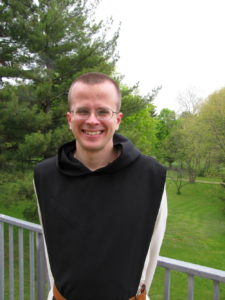Vocation Stories
Brother NicholasNew Melleray Abbey
“My vocation came to be, whole and entire, when I encountered the Liturgy of the Hours.”
This is supposed to be a vocation story but I really can’t do that because my vocation is not a story.
My vocation came to be, whole and entire, when I encountered the Liturgy of the Hours (Liturgia Horarum) prayed in common while I was on retreat shortly before my 19th birthday. I immediately fell in love and realized that God was calling me to make the celebration of the office the center of my life.
 It took me another three years to figure out what that meant (and the task of accepting the sacrifices that it demands is still incomplete) but that is not the story of my vocation but the incarnation of it.
It took me another three years to figure out what that meant (and the task of accepting the sacrifices that it demands is still incomplete) but that is not the story of my vocation but the incarnation of it.
What I can do is explain why I find making the celebration of the Liturgy of the Hours the center of my life attractive.
The liturgy first attracted me as a means of personal prayer. From the beginning I found it very easy to make the psalms my own. It is very natural for me to thank the Lord with all my heart or to say amen to the idea that great are the works of the Lord to be pondered by all who love him.
By the time I encountered the office I was aware of my need for mercy and so found it very easy to pray have mercy on me God in your kindness. Even the so called “cursing psalms”, which are a problem for many people today who can’t reconcile them with the command to love your neighbor as yourself do not trouble me.
To pray “I hate them with a perfect hate and they are foes to me” or “God kill them lest your people be seduced” has never been a challenge for me. I automatically apply them to the evil that I daily experience trying to draw me away from God.
This experience of personal prayer was quickly paired with a very high theology of the liturgy. I believe that the liturgy on earth is a participation in the liturgy of heaven. The early Cistercian tradition includes a significant number of visions where saints and angels were seen attending the community’s liturgy. This is an expression of the fact that the heavenly and earthly liturgy is one.
Thus through the Liturgy of the Hours we are brought into union with the whole church. While I am not always aware of it and do not always experience it, I know that in singing the office at New Melleray I am joined with all those who have come before me and all who will come after me and with Christ our head.
We all praise God together in the beautiful and glorious liturgy that he has given us and this praise of God is the raison d’etre of creation and will remain forever as the eternal expression of our faith, hope and love.
As my faith has grown I have more and more come to experience this and in experiencing it found the liturgy to be a wonderful way of contemplation. Participation in the liturgy (any Catholic liturgy, even a very badly done one) is objectively a participation in the heavenly liturgy and thus a communion with God the Father, through Jesus our head, in the Holy Spirit.
When that is an experiential reality the liturgy is contemplation.
Even when that truth is not experienced, the liturgy still brings us into contact with God and the texts and prayers provide guidance and starting points for our own prayer.
Last of all, within the monastic tradition where we gather in church seven times a day to pray, the liturgy provides a structure and discipline to the day which I find very helpful for maintaining mindfulness of God throughout the day.
Those are the three main reasons why I personally value the Liturgy of the Hours and have accepted God’s call to dedicate my life to its celebration. There is, however, a fourth reason why the liturgy is good.
The liturgy is a service to the world. By publicly celebrating the liturgy we bear witness to the Truth. The liturgy in itself testifies to the truths of the faith and the importance of the spiritual life.
In addition the witness of a community truly dedicated to the liturgy is an implicit but powerful refutation of the modern myth that the material world is all there is.
This fourth reason is not as personally important to me as the other three but I find it important as an answer to those who claim that the monastic life is not a service to the world.
In conclusion, I became a monk at New Melleray Abbey because God calls me to himself through liturgical prayer.